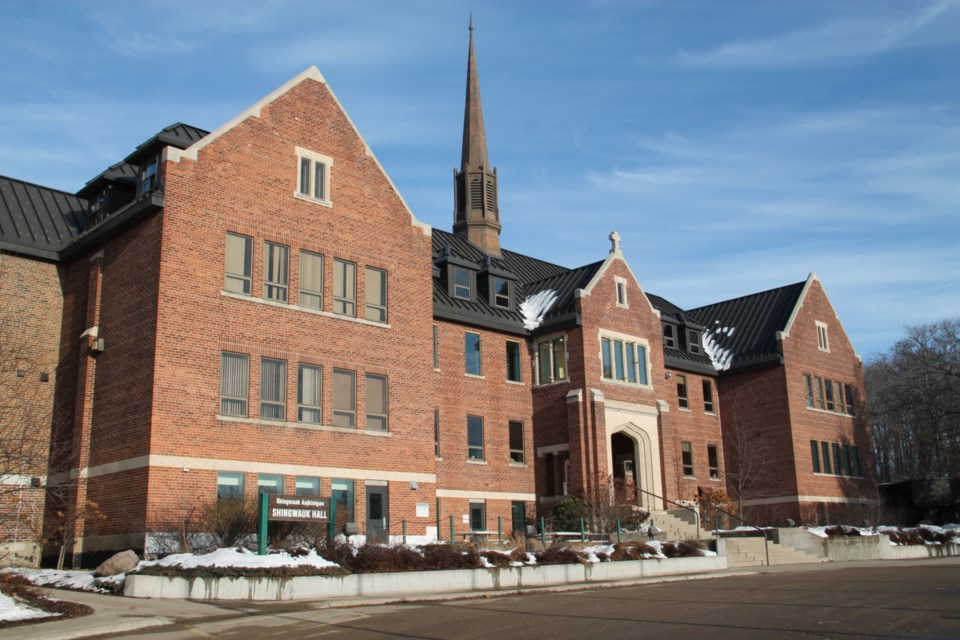Algoma University’s upcoming spring and summer sessions will happen, despite the havoc COVID-19 fears have caused in classrooms.
Instruction will be delivered to students online.
“We’re playing it cautiously, in terms of what we’re seeing from public health and some of the announcements of late from the healthcare system, so we feel the best way to move forward is to offer spring and summer programming through online approaches,” said Asima Vezina, Algoma University president and vice-chancellor, speaking to SooToday after Thursday’s Algoma University teleconferenced board of governors meeting.
Seventy-one per cent of 131 students who replied to an Algoma outreach committed verbally or by email to attending spring and summer sessions though they realized instruction would most likely be delivered online, said Brent Krmpotich, Algoma’s enrolment management and international operations director, speaking to the board.
Dates for Algoma’s spring and summer sessions are June 1 to July 10 (exams July 13-14), June 1 to Aug. 25 (exams Aug. 26-31) and July 15 to Aug. 25 (exams Aug. 26-31).
The tuition fee deposit deadline has been extended for all students to April 30 with final payment due June 1.
While Algoma University’s Sault Ste. Marie, Brampton and Timmins campuses are shut down to conventional classroom studies due to fears of COVID-19, every Algoma student is continuing with his/her program of study in cooperation with their professors to complete the current academic year.
Algoma’s approach to classroom alternatives has been unique, Vezina said.
“We gave the freedom to our faculty to really make the decisions for their students in the very best way they could, so we have a variety of approaches that are going on right now to help students through the next three weeks... to determine the very best way to finish that course work. We’ve got a lot of variety out there.”
“Students are videotaping and submitting oral assignments, submitting recordings, students have done their final art projects which have been displayed in different rooms, then videotaped and sent to professors, some professors had students do a final assignment as opposed to other course work that had been planned...I’m really quite thrilled to see how personalized the instruction has become,” Vezina said.
“Our classes have between 20 and 40 students, so our faculty really know their students... students are interacting with their faculty quite regularly through different means. Some are super technically literate, and then we have others who are using less technical ways, but everybody is interacting, they’re talking, they’re working through it and that’s making me feel really good about our university and how we’ve approached the situation.”
“Our students understand we're in this really unprecedented time. Our students are quite technically savvy and are responding well, and they’re actually coming up with ideas for professors... we’re really working together, students, faculty and administration, to come up with unique and really good ways to get the spring and summer program going because some of our students need these courses to graduate. Some of these students are here on visas and need to continue their studies, and we’re responding,” Vezina said.
Meanwhile, Vezina said members of the Children of Shingwauk Alumni Association executive, individuals in their 70s, 80s and 90s and still active within the community, will soon be setting up ‘virtual tea’ online sessions for any students who wish to talk and unload their burdens during this difficult out-of-classroom time.
“It’s their way of giving back to the students and trying to help them work through any of the anxieties, worries and stresses they have. I thought that was beautiful and they’re using technology to connect and support our students. I thought that was a beautiful example of what it means to be a part of the Algoma community.”
Vezina added several members of the Children of Shingwauk Alumni Association each gave $100 to the Shingwauk Residential Schools Centre director to purchase stuffed animals to comfort students in residence who are currently separated from their family members.
One hundred and fifty teddy bears were purchased and distributed to each of the students in residence at the Sault campus as a cheer up gesture by Elizabeth Edgar-Webkamigad.
“The physical plant and custodial staff...have been just absolutely incredible (in acknowledgement of their work during the COVID-19 shutdown),” Vezina told the board.
“That entire staff is still working as part of the essential services. Every single one of them has just been absolutely incredible, every single one of them.”
“There’s so much good stuff going on when a whole community comes together. It’s incredible. Everybody’s doing their part,” Vezina said.



